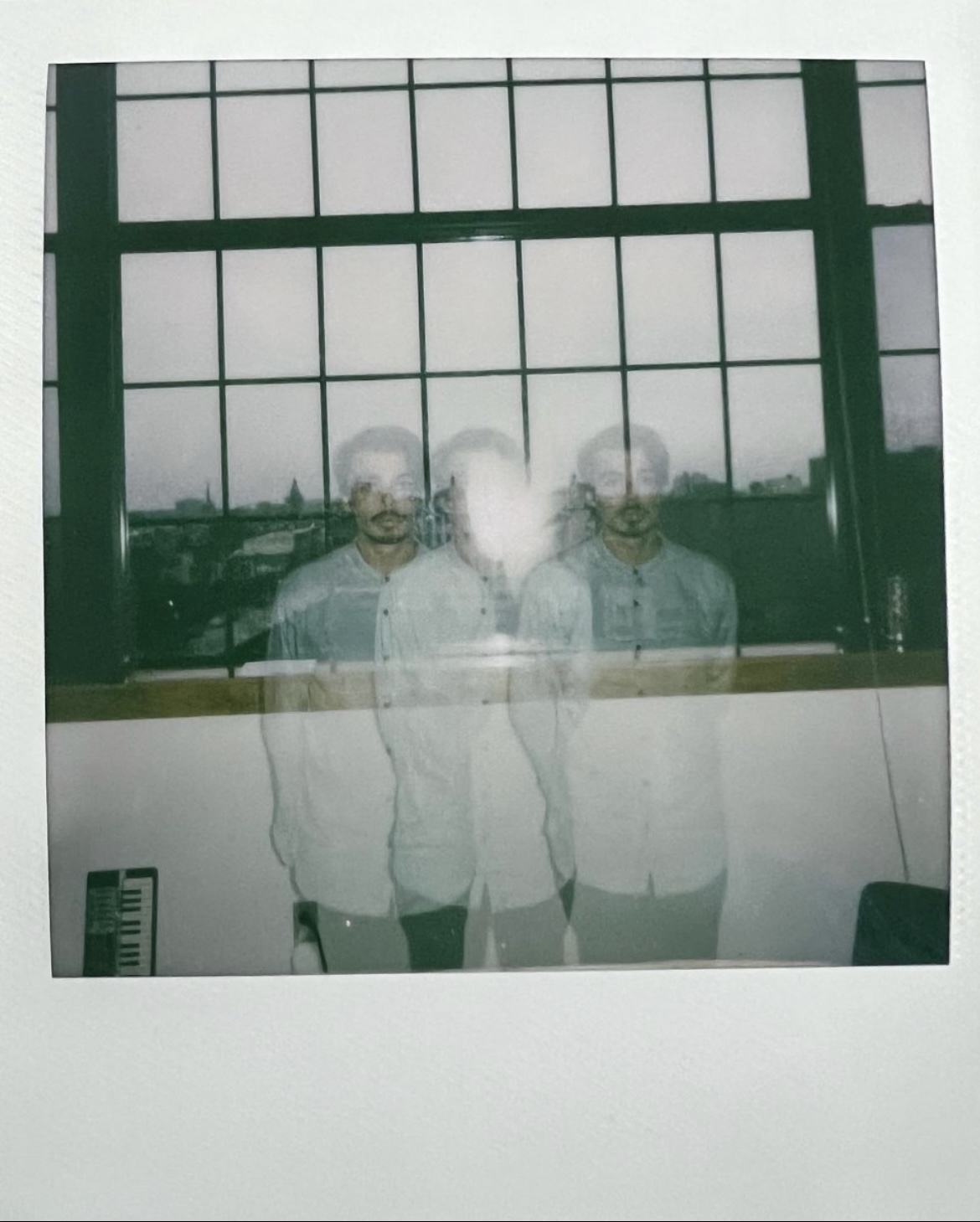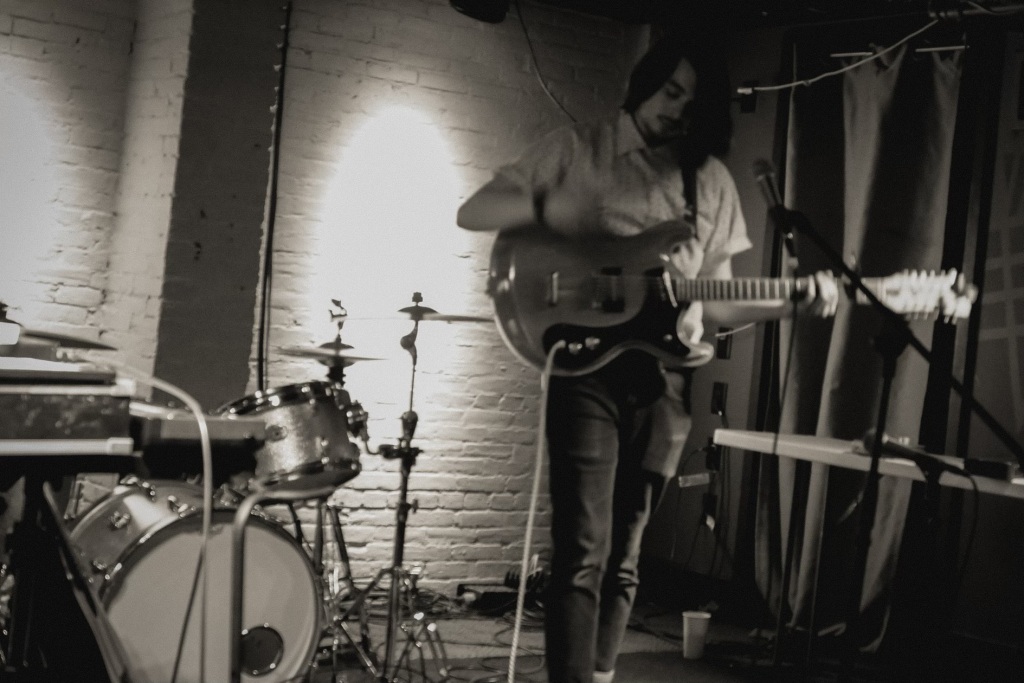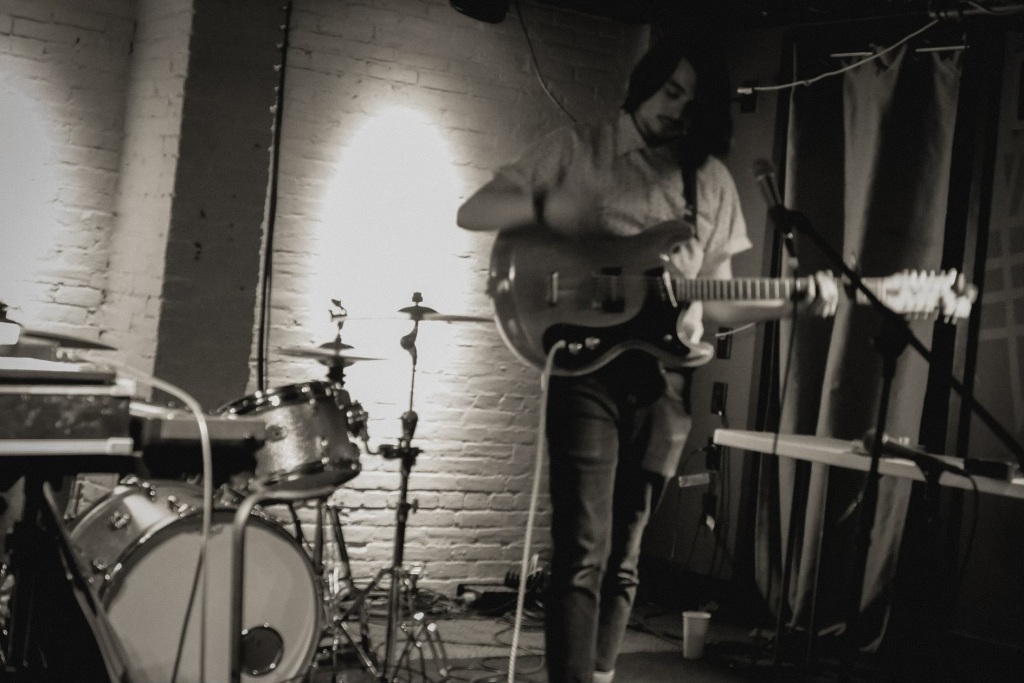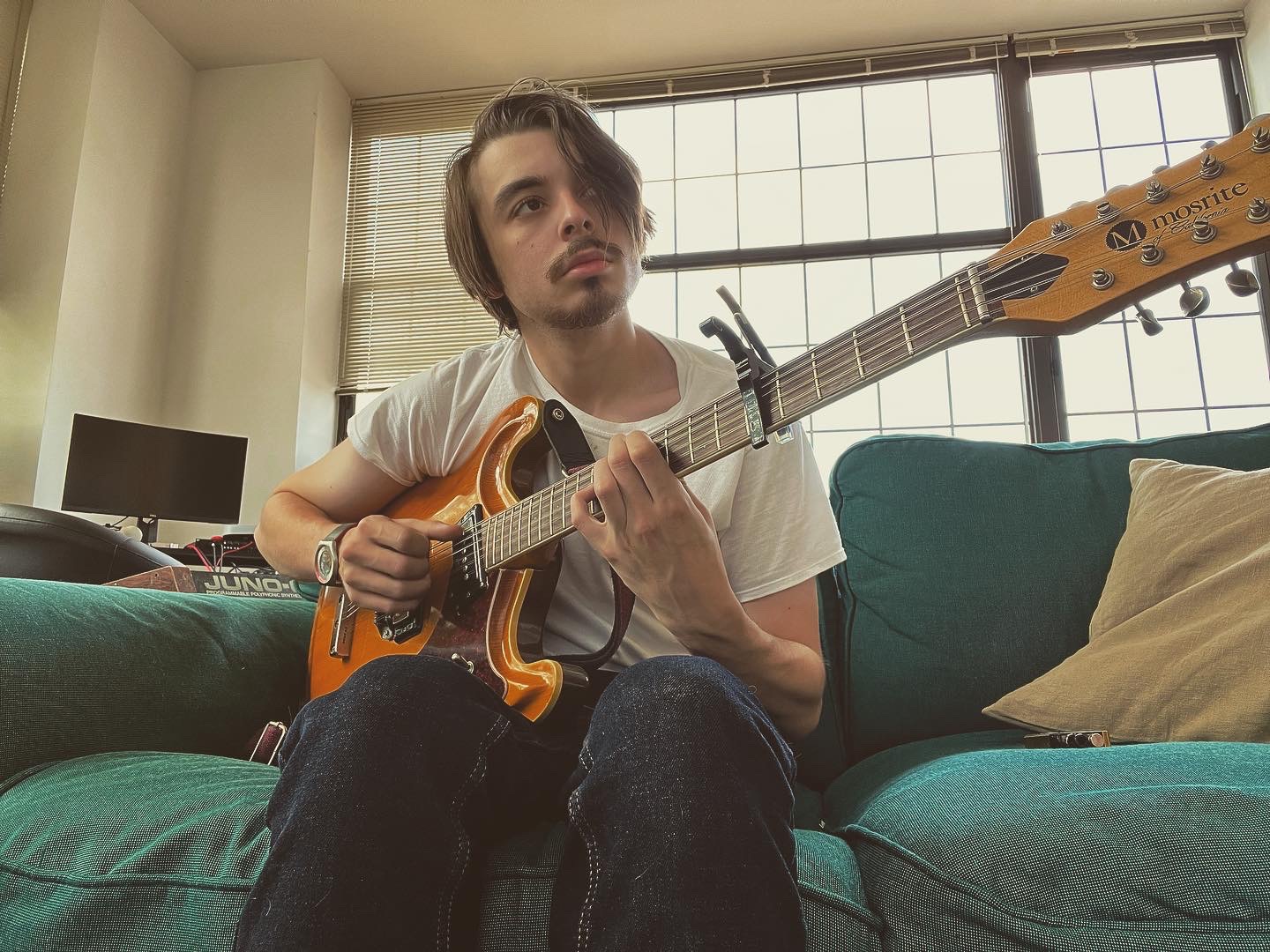Jakob’s love of music guided his early life. From the age of two, he’s turned to a drum kit when he wanted something to hit. Jakob’s love of music continues to heal. As a self-proclaimed fan of “outsider music,” Jakob speaks with me about Baltimore’s psychiatric wards, insomnia, and standing out and fitting in as he creates music under the moniker “Oracle Porpoise.”
M: So how has your day been up to this point? It’s 5:30 there, right?
J: Yeah. I worked last night. I don’t mind it, but I closed last night and I opened today. I’m quite exhausted. I finally finished moving yesterday. I just moved a mile and a half down the road because, you know, it’s Baltimore, it’s not the world’s largest city in terms of square mileage.
M: Have you always been based in Baltimore?
J: I went to school in Boston for a couple of years. I went to Berklee [College of Music] and outside of those four years, I’ve lived in Baltimore.
M: When can you remember noticing music in your life?
J: It’s always been there. I’m the first musician in my family. I started drumming when I was two. I was an incredibly unruly child. My parents got me a punching bag and a drum kit for Christmas when I turned two. For whatever reason, it just clicked and I’ve stuck with drums from then on. Drums have always been there and as time went on I taught myself more and more instruments.
M: Your parents were supportive? They bought you a drum kit.
J: They’ve been really, really supportive of the music thing, since I was little. Although not musicians themselves, they could see how much I adored doing it and never once told me to settle for anything less. I was always told to chase it. The sheer amount of sacrifices they’ve made in order to allow me to do so is dumbfounding and I will never, under any circumstance, be able to repay them. Here’s to hoping I’ll be able to someday. My dream school was always Berklee and they encouraged me to go. They’ve been to the vast majority of my shows. Beautiful thing, that.
M: That’s amazing. How would you describe how your perspective on music has changed from when you started to now?

J: I’ve gone through various iterations of what I’m into, in terms of listening and playing as a drummer. I started off playing rock stuff. I then gravitated into prog rock, listening to Tool and Rush then into math rock listening to bands like TTNG, early Maps and Atlases, Hella, Tera Melos, Piglet, Totorro, and countless others. I was hell bent on speed. Being the fastest I can be. But now I’m much more into nuance and finesse. Speed matters don’t get me wrong, but I prefer to write drum parts that are “slippery and melodic” over just a barn burner. Although I never left drums behind, I began having ideas that I wanted to see to fruition. Writing records that I haven’t heard before and always wanted to. Thus “Oracle Porpoise” was born. I started off making ambient music and there’re still ambient aspects to the music but my compositional process has changed with time. What was formerly an additive process, slowly became a reductive process. As a kid it was, what else can I add, what else can I add, how can I fill this one gap right here. Now it’s, how much of this can I take away before it no longer works. I’ve grown to love the gaps. That’s where the music speaks in my opinion. As I got older and grew “away” from the prog and math rock stuff, I started liking quieter, stripped-back music. The more skeletal the better. I always find the demos of songs to be far more moving and emotionally present. The demo is nearly always better. I’ve always listened everything. My parents always had a wide, eclectic taste in music. As a kid, I was ostensibly barred from listening to kids music. I listened to whatever they wanted to show me. It was rad. Regardless, when I throw something on now, it’s something quiet, not too fast, not too in depth, not too distorted. I tend to listen to singer-songwriters that make singer songwriter, lofi, “outsider music.”
When I started the “Oracle Porpoise” project, I didn’t have much equipment. All I had a Roland Gaia (synthesizer.) I still have it. I had that and an iPad, one guitar, and three pedals. My first record is the most ambient/post rock of all the records. The music I make used to sound more electronic and now it’s far more acoustic, guitar driven. When I first started playing guitar in 2016, I didn’t know how to play a lick of guitar. So I had to mask it in, by drowning it in effects to cover up the fact that my hands weren’t really ready to play a lot of the things that were in my head. I was sluggish at grabbing chords. As weeks turned to years, I progressed enough that I could finally, actually play what was going on in my head. I’m not an amazing guitarist, but I love playing guitar. Guitar is fun. My style now has shifted from having a lot of electronic elements and big soundscapes, to me and my guitar with a couple of effects on, and that’s it. As I said, the more skeletal the better.
M: Why do you think music is fun for you?
J: It makes me happier than anything. It’s always been my happy place since I was a little kid. I’m on the spectrum and I seriously struggle to socialize and really relate to people. Music is how I do it. I talk about myself, my life, and things that I’ve desperately wished to tell people, through the mode of song. As I grow up, I feel I’ve gotten more effective at doing that. I’m 24, right? I started “Oracle Porpoise” when I was 16. I can’t truly pinpoint why I love it so much. There are so many reasons why I love it. It’s so much of what I do and who I am as a person. Music shaped me. The music scene shaped me. I started gigging at 11 so it was a trial by fire. When I’m playing music, it’s relaxing. Cathartic. It’s calming. It keeps me grounded.
M: Can you remember some of the first artists that you were influenced by?
J: My parents relayed this story to me; I was a toddler and I learned to drum the entirety of the blue album by “Weezer.” I don’t remember this. Another little childhood anecdote. My parents have told me my dad would go to the punching bag and I’d follow him there. I’m down there as a toddler, you know, completely ineffectual to the punching bag. My dad would throw on a CD of Repeater Plus Three Songs on by Fugazi and I couldn’t say +123 repeater. I was saying “unto fee a peter” and like little things like that. Singing Tom Morello’s parts in a car seat whilst listening to Rage Against The Machine. My influences for Oracle Porpoise are varied. Obviously I still pull from the prog and math rock bands but I had completely different subset of people that I idolized for different reasons; Daniel Johnston, Sibylle Baier, Nick Drake, Songs: Ohia, Low Roar, Sparklehorse, Daisuke Tobari, Jose Gonzalez, Townes Van Zandt, Women, The Microphones. All of these sort of niche kind of guys. I got hip to The Caretaker in 2011, right? Oh, so good. Changed my life. And then it just snowballed from there, Astral and Shit, Aphex Twin, Eluvium, Basinski, Explosions in the Sky, This Will Destroy You. Going down the rabbit holes of Temporary Residence, Sub Pop, Captured Tracks, Sargent House.


M: I often hear Daniel Johnston cited as an inspiration for the people that I interview connected to David Bixby. What drew you to Bixby’s music?
J: I was doing a deep dive into the outsider music lofi folk rock thing. It was 2019. It was right around the time I got into, Johnston, Wesley Willis, Connie Converse, Jeffrey Lewis, Elliott Smith, and Deadharrie, who I all love. Then I came across Dave Bixby. I remember listening to “Ode to Quetzalcoatl” and one of the things that drew me to his music so clearly was the songwriting. The writing is, it’s not necessarily free verse, but it’s kind of based on a refrain as opposed to a standard verse and chorus type of structure. I remember hearing (the song) “Morning Sun” first and I was like, well, this fuckin’ rocks. I then went to run it on from the top and “Drug Song” comes on and I’m like, dude, this guy fucking rules. Soaked in delay. A strange and beautiful amalgam of hifi and lofi. He’s been a big influence of mine. That record came out in 1969 and it’s still pretty fresh.
M: I find that people identify a solitary theme in the album. Is that something that you identified? And is that something that you find in your own experience with music? Is it a solitary experience? Do you do a lot of solo work? Do you prefer to work solo?
J: I much prefer to work by myself. I’m pretty withdrawn and quite isolated from most people a lot of the time. I’m a control freak. Not a neat freak, because my place is kind of a wreck all the time. But I’m a control freak unfortunately. If I have this idea and I believe that it’ll work, I don’t want to have to justify myself to try to sell somebody on my idea. I just want to do it and have full faith that what I’m doing is succeeding in the way that I want to in spite of reception. And if it isn’t succeeding, then so be it. It’s my fault and no one else’s. I would still rather have complete control of my writing process. That’s part of the reason why I record at home. I don’t like going into studios where everything is a cost, time is money. Gotta go, gotta go now, gotta go now, gotta get it because we’re on the clock, we’re on the clock. I want to sit around and take my time. Noodle around. Meander on some parts over the course of hours and days. I’m half a hermit so comfort is imperative to the process. I’m nocturnal effectively. I don’t sleep ever. I get, like, two hours of sleep a night still and I’ll just stay up all night when it’s quiet and when it’s just me and it’s very calm. Nobody’s texting me. It’s just me and the whole world is asleep and here I sit starting to tell my stories. I love working alone for that reason as well. There’s something about working alone that’s very gratifying. I know that I made this happen. I put in a horrifying amount of hours, blood, sweat, and tears. That’s something that I value in being able to do. I’m eternally grateful for that but I’m not sure who to thank. My love of music was nurtured and then I just got lucky, I guess. Because I’m on the autism spectrum, it’s comforting knowing that in my solitude, I can create something and show it to a large group of people. It’s something that made sense to me and it’s something that makes me unequivocally happy. I adore being on tour, being in the car, seeing the sights, buying stupid truck stop shirts, driving, all of that stuff. Fundamentally, the thing I love about working solo is that I can do whatever I want. I don’t like rules. “You can’t mix this way, you can’t write it that way”… fuck off. Music can be anything you imagine. People seem to forget that. There are no rules. I can do whatever dumb thing I want to do and it’ll probably turn out just fine. So long as I’m patient enough.
M: So you like to create solo but you enjoy performing for an audience?
J: To an extreme degree, I love performing for an audience. I don’t like going out into the crowd after, it’s o overwhelming for me. Crowds are scary. That part of myself is at ends with my profession. Being up on a stage under lights is completely different. When I’m up there, I don’t really hear the crowd. I don’t hear people talking. I don’t really hear the cheers or anything. I’m in this quiet Zen little mode. My head is so quiet when I’m up there. Then I play my songs and I go and hide away somewhere else. It’s hard for me to go out into the crowd after I sing my songs because they’re very personal and transparent. Nevertheless, I still greatly appreciate anyone who comes to the shows and listens to the tunes.
M: What would a typical day look like for you? How often do you spend working on music?
J: It’s not really a set thing. Left to my own devices it’s nigh on chaos. No schedule whatsoever. There will be bouts of time where I won’t touch an instrument at all. I released (my album) “Endling” a year ago, and in that time, I’ve written 10 tracks. Per record, I write a minimum of 40 before I even start paring back towards the finalized record itself. There will be days where I get crazy bursts and I write four songs or four demos. After that, there’ll be three weeks where I play guitar twice. I’ll just pick up my guitar with no goal in mind at all. I don’t like playing standard. I always tune to alternate tunings. So, I’ll tune to a new tuning, having no idea how to play in it. I’ll sit there and tinker with it and see if I can make anything happen with it. Maybe it’s inspirational. Maybe I hate the tuning and don’t end up going back to it. It depends on my mood and interestingly depends on the season. I tend to do a lot of writing in fall and spring. Don’t get me wrong, I write year round but it seems to me that a lot of the best stuff comes up around those two seasons.

M: I think there’s a connection between nature and ambient music somehow. I’m not sure how to articulate it, but I guess one kind of calls to the other and vice versa.
J: Right. That’s part of why I adore the poetry of Robert Frost so deeply. Seasonally, I’m cobbling together songs over the course of however many years and weeks. Some of them are gonna be garbage. That’s the nature of being an artist. You just have to figure out which ones are garbage and which ones aren’t.
M: And what is a garbage song to you?
J: Hard to say. It’s a feeling. I’ll write something and I’ll like it in the moment, but when I go back and listen to it I think “what on Earth was I thinking?” Sometimes I think it doesn’t achieve what I want to achieve even though ,when I’m writing, I don’t set out with a song nor a clear goal in mind. I also tend to bounce tracks off of one person in particular to get their opinion. My friend Alex. He’s like a brother to me and he’s the hidden second member to the project. He has never lied to me and I trust his judgment implicitly. Sometimes I take his advice… sometimes I don’t. But I trust him. From there, everything I do is purely feeling-based. Hands directly to Ableton and tape. I have a Tascam 38. What a lovely machine. I also use a great deal of cassette dictation machines that have a soul like no other.
M: What is your favorite project that you’ve done so far?
J: My favorite project I’ve ever done is Oracle Porpoise. It’s truly my passion project.
M: Do you have a favorite release?
J:
Oh yeah. Endling. My newest one. It was my favorite to see come to fruition. A lot of releases, I’m like, yeah, my record’s done. This was fun. But when I finished that one, I had this crazy elated feeling that I hadn’t felt with any other record… [Jakob, speaking to his cat] Miina, can you fucking stop? [Jakob, to me] She listens and talks nonstop. I love her so much. Such a well-behaved little lady.
M: Maybe she wants to be in a song.
J: She is, she’s in so many songs and demos because she doesn’t shut up. She always has something to tell me about and I’m always keen on listening.
M: Really? That’s perfect. One of the benefits of recording at home.
J: Very much so. I really like hearing the room and the environment I recorded in. Including her little interruptions. It adds character to the music.
M: Are you drawn to animals? How did you come up with the name Oracle Porpoise?
J: I adore animals. Coming up with the name was a fluke. In high school the nocturnal thing started to get really out of hand. Worth noting, never changed. I was making my first record called ∆\\, which is only on bandcamp. I’d been up for an exceptionally long time, probably 36 hours. I’m sitting in my parent’s basement, mixing and coming up with my early stuff. Your brain does really funny things when you haven’t slept. The phrase just popped into my head. I wrote it on my laptop screen in Expo marker and then closed my laptop and went to sleep in the basement on the couch in my jeans. In the morning, I opened up my laptop and “Oracle Porpoise” was written on the laptop screen. It made me laugh. So I kept it and never looked back.

M: That’s awesome. What feelings would you say your music typically evokes; comedy, joy, sadness? You said that your latest album “Endings” was difficult for you to write because of the content. Could you expand on that?
J: My music, since the beginning of its time, has been sad, down tempo, melancholic, depressing music. Two thirds of the record “Endling” was written when I was doing a stint at the day program at Shepherd-Pratt, a psychiatric institution in Baltimore, one of the best in the country. It’s a great program. Being there was profound. Some of the things I heard were plainly beautiful and inspiring. It gave me ammunition. I was writing in there, folded in two, in a notebook. The record was pouring out of me like I hadn’t experienced before. It was me spilling all of the sad thoughts into the open. Coming clean. My mental health problems were one of the best kept open secrets; everybody knew, but no one really knew about the suicide problems that I had. So I wrote an entire record about that.
M: Would you say that music is healing for you?
J: Yes, because after I wrote, I felt a lot better strangely enough. Even though mixing it for months was devastating. Living in it was arduous but at the end of it I felt more human. That’s not to say that I don’t still struggle, but music has always been a thing that’s kept me from spiraling.
M: You pursue music for self expression?
J: Very much so. I best convey my emotions, especially heavy, darker emotions, through the medium of song and poetry. I make music for the sake of making art and nothing else. I just want to make art even if it means being destitute. I’ll never sacrifice my artistic integrity for a couple of dollars.
M: What are some of your musical goals?
J: Although I’m not in it for the money, I want my music to be able to support me financially so that I can continue to make my songs comfortably. I’m not even necessarily saying fully financially. I could work a part-time job, you know, 15-20 hours a week, if the vast majority of my income came in through my art I’d be content. Unfortunately, one of the things that comes with that is fame and it’s not something I really care about. I want to live a quieter life. I also want my art to reach a people. Hopefully they like it, and if they don’t, they don’t and that’s okay. But I just want my music to make people happy even if it makes them sad. I know that’s a strange sentence. You know what I mean? I want people to think, “I can relate to these complex emotions. I’ve been there before.” I don’t want people to feel alone. Loneliness is evil. I’ve felt alone for a lot of my life, rather alienated and ostracized. I want people to feel some sort of relief when they listen to my music. Mental health stuff is still so “hush, hush.” If I write about it and I release it to the world, it could reach, you know, some young kid like I once was, who feels super alienated and like an outsider. I want people who suffer with that to feel heard. To feel like they have someone. Lyrics can resonate. I want people to listen and think, I understand what he’s going through and he went through what I went through. In summation, what I want for the future is, simply, for people to listen to my music. I want them to be happy when they listen to it, and in turn, have that be able to support me enough financially so that I can continue to do it full-time without the fear of…not being able to do it, you know?


M: Yes. What are you currently working on?
J:
My next record! It’s lo fi and ambient and math rock all at once. I’m excited for that LP. It’s gonna be cool and fun to make. I’m having a good time writing it and I’m quite proud of several of the tracks. I don’t know when it’s coming out, because I am not anywhere near close to completing it, but I’m working on it slowly but surely. I’ve got a couple of tracks that I know for sure on it.
M: Fantastic. Do you have a title you can give us?
J: No, I’ve got nothing as of yet.
M: Do you ever doubt yourself musically?
J: All the time. Self-doubt is something I live with and I feel as though part of being an artist is the intrinsic doubt in your work.
M: What keeps you dedicated through the doubt?
J: Dedicated through the doubt, huh? I don’t know. That’s a great question. No one has ever asked me that. It’s a compulsion of sorts. I have to do it. I can’t seem to not.
- Madison McLean, Harbinger Journalist

Hear more from Oracle Porpoise on Bandcamp, Soundcloud, and Instagram.
